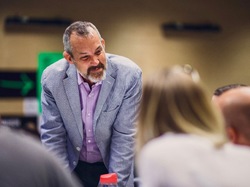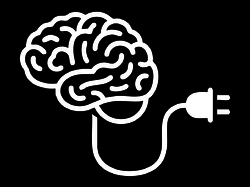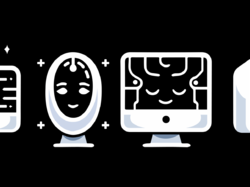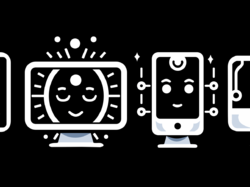
I’m fresh from the Future of Web Apps (FOWA) conference in London, and it turns out that the future of web apps, like so much of the world right now, is not exactly certain.
Although most of the sessions focused on the shiny possibilities of new web techniques and technologies, the unsettling reality of plummeting markets outside the convention center’s walls was hard to ignore. (My commute to the conference passed the Bank of England, where I heard several snippets of mobile-phone conversations that were variations of, “the world is going to hell.”)
Keynote speaker Tim Bray was one of the few to give the market crisis more than a passing remark in his talk. “I’m turning my keynote from a bright, sunny talk about cool web technology into a dark, foreboding talk about getting through tough times.…I predict some really shitty times coming at us right now,” he said, as he moved to his first slide. It was titled, “I’m scared.”
Despite this ominous opening, I found the spirit of his talk to be essentially hopeful, outlining the opportunities a downturn might provide and the positive steps that individuals and companies can take to survive and even thrive in tough times. It’s worth a listen.
Ideas flow when money doesn’t

To me, the web was at its most interesting during the wilderness years between the dot-com bust and the Web 2.0 resurgence. Funding for new ventures was slim, and chances of getting rich from a new online property were remote. The money guys retreated, leaving behind the folks who were genuinely interested in making something new for little more than the simple pleasure of invention.
Web 2.0 archetypes Delicious, Flickr and Basecamp were developed during this period, all beginning as humble tools for internal use by the developers or their communities. This was stuff that the makers wanted to use themselves, and they built these apps first and foremost to give their users new superpowers. Business success was the side effect, not the goal.
The developers of all three of those apps were at the very first FOWA conference in February 2006. It was a very different event at a time when money was only just beginning to find its way back into the industry. It was a makers’ gathering, marked by an earnest community spirit, a sense of banding together to build something new and cool and useful. Talks were focused on techniques and discoveries, on how to make applications and websites talk to each other, how to make the web a two-way conversation instead of a one-way broadcast. No kidding, it was exhilirating.
To be sure, that spirit was still present at last week’s installment. I got a lot out of the generous, nitty-gritty talks from developers Matt Biddulph, Blaine Cook, Chris Messina, David Recordon, Joe Stump and others. But that maker spirit also competed with more mundane messages from venture capitalists, managers and business pundits.
I don’t have anything against making money or people who are good at it (alas, I don’t seem to be one of them), but I do think that chasing Benjamins too often kicks innovation to the curb. A gold-rush mentality means herds of copycats. It means putting a buck before the original notion of providing a great or useful experience. As evidenced by the current market crisis, a flood of money can blind us to good sense, corral us into the lowest common denominator.
In an interview at the Mavericks at Work blog, Arkadi Kuhlmann, founder and CEO of ING Direct, described the dangers and temptations of the herd mentality:
Every person who tries to do real innovation is going to be tempted by money, greed, acceptance, being in the middle of the action. But at the core there is one fundamental difference: I know why I’m here. I want to make a difference. If I was into this just for making money, being a big accepted banker, I would have been tempted. But that’s not why I’m here. I am trying to build something that changes the business, that allows me to stay on the right side of the discussion.…
When you run with the pack, what you generally see are other people’s backsides. We know why we’re here, and it’s not to copy other people’s bad ideas.
Back to basics
With cash for brassy new ventures in short supply then perhaps we can fill the void by discovering new ideas in old idealism. In this weekend’s New York Times, literary critic Harold Bloom reminded us of what Ralph Waldo Emerson said about hard times and the restorative opportunities they present. During the 1837 financial panic, Emerson wrote:
The present generation is bankrupt of principles and hope, as of property. I see man is not what man should be. He is the treadle of a wheel. He is a tassel at the apron string of society. He is a money chest. He is the servant of his belly. This is the causal bankruptcy, this is the cruel oppression, that the ideal should serve the actual, that the head should serve the feet. Then first, I am forced to inquire if the ideal might not also be tried. Is it to be taken for granted that it is impracticable?
…and two years later in “Self-Reliance”:
Power ceases in the instant of repose; it resides in the moment of transition from a past to a new state, in the shooting of the gulf, in the darting to an aim.
During the fallow years of the last dot-com downturn, the web’s idealists ran the show, and we did shoot the gulf. Something new and important emerged. Painful as it will likely be, this new financial reality may turn out to be another opportunity for folks building the web to revisit core values, to consider what it is that we really want to make. How can we make the web a better place? The right answers will put bread on the table, too. No matter what the economic conditions, there’s always a market for cool, useful, affordable.
I had the good fortune to chat with Kathy Sierra after her excellent keynote at FOWA. She told me about how she came to be creator of the unconventional Head First series of technical books and author of the celebrated but sadly departed blog Creating Passionate Users. First step: Getting fired from her gig at Sun Microsystems. “I was a single mother with no job, and I was terrified,” she said. “I had no idea what I was going to do.”
Kathy’s a coder, a former video game developer, who also happens to have a deep interest in community building and cognitive science. Plucking ideas from her personal interests and professional values, she created a new career by inspiring others to, well, inspire others. “There are definitely opportunities in tough times,” she nodded.
Doing well by doing good

So what are the good-for-the-web core values that might help us ride out the downturn? Tim Bray’s keynote offered some practical suggestions, and I’d like to riff on those and suggest a few more:
Make yourself useful. Build products and services that address the basic needs of individuals and businesses. Make stuff that helps people kick ass at the essential things that they do every day. This is no time for fluffy add-ons. Make something that goes to the center of what people want to do and create.
What would you find useful? There’s no better way to build something useful than to build something for yourself, something that satisfies your own practical demands. If you hanker for it, somebody else does, too. Find a market in yourself, satisfy that need, and share it with others.
Engage your audience. In a culture so rife with lousy customer service, it doesn’t take much effort to rise above the rest. Make it easy for customers to talk to you, ask you questions, offer criticism. Reward their faith in you by returning generous responses that actually help them. Put our many fabulous social technologies to work: start a blog, create a discussion forum, add a product wiki, whatever. Just encourage conversation.
Help others into the conversation. Create products and services that help others engage their audiences and communities. Nothing could be more valuable right now than helping companies to better connect with customers, and individuals to better connect with each other. In tough times, there’s shelter in community.
Save people money. With cash in short supply, inexpensive products and services that create new efficiencies will help people do more with less. Make a living by helping others make theirs.
Bootstrap. Don’t forget to save your own money, too. Credit and investors will be rare and expensive, make do with what you have. Find the other good souls making products meant to save people money, and put them to good use.
Be agile. The future is too uncertain for monolithic longterm projects. Develop your products and services incrementally, in small projects scoped to a few weeks at a time. Respond to actual demand, not to pie-in-the-sky forecasts.
Share. Be generous with what you know by sharing your skills and discoveries. Contribute to open-source projects. Share your ideas in mailing lists and online communities. Participate in local professional groups. Be visible, and build a reputation as a person who has answers that help others get things done. A bank of good karma is invaluable in dark times.
I certainly plan to redouble my efforts in these areas, and I hope you will, too. It seems to me that this is the real future of web apps.





